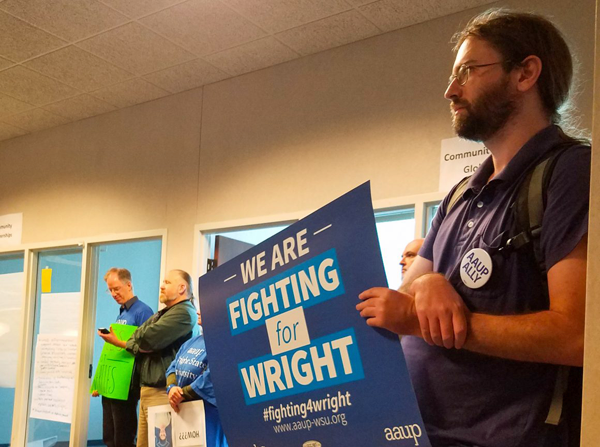
Excerpt from the Guardian
Wright State’s faculty union sent out a survey through email this morning [Nov. 29, 2018], advising its members to vote on whether or not they would demonstrate at this semester’s graduation commencement.
“We want everyone to register to attend commencement on Saturday, December 15. We will soon send a poll asking your opinion on potential actions during commencement,” the email reads.
The demonstration, if it happens, would be held in place of a union protest originally planned for the Board of Trustees meeting on Dec. 14.
“A big majority of students were happy to put on ribbons saying something like ‘faculty4students, students4 faculty’ and such slogans,” said Noeleen McIlvenna, WSU professor and contract administration officer for the faculty union.
“We are probably going to do the same this time. Some faculty want to do more; to explain to the families why there is talk of a potential strike at WSU. Other faculty are not sure if commencement is the right moment to do that, so we are asking our members what they think we should do,” McIlvenna said.
“We know that none of us would dream of bringing a negative tone to a day that honors and celebrates the collaboration of faculty, students and their parents to change the lives of so many people in the Miami Valley and beyond,” McIlvenna said.
McIlvenna said that anything the union might do would be done “to protect the future of WSU” and “in the spirit of working together.”
The email also included a link to the survey, which listed the three options for members to vote on:
“Option 1: Informational picketing: i.e. we carry Fighting for Wright signs (and perhaps others) and hand out leaflets, explaining how proud faculty are of their graduates today and how they have persevered, that they have received a world-class education and that we are fighting to protect that quality of education at WSU for the younger brothers, sisters and neighbors yet to come.
And that is why we are not prepared to accept a contract that damages education through retrenchment and workload and health insurance language. We ask them to wear their buttons and bracelets in support of that mission. We also wear 17c buttons and hand out blue bracelets and AAUP ALLY buttons.
Option 2: No signs, just leaflets. We also wear 17c buttons and handout blue bracelets and AAUP ALLY buttons.
Option 3: Only wearing buttons and handing out blue bracelets and /or AAUP ALLY buttons.”
Contract negotiations between the faculty union and administration have been ongoing since 2017. Negotiations have recently escalated since an impartial third party known as a fact finder released their findings on both parties’ stances at the end of October.
Now, the administration and Board of Trustees may impose a last best offer before the union can initiate a strike. Representatives from both faculty and administration have said that talk of a strike is premature.
The Guardian spoke to students for their thoughts on a potential demonstration at commencement. They had this to say:
“I would be mad,” said senior Araceli Ramirez, who will be graduating in December. “We’ve spent so much time working up to this moment and all that takes [it] away from us.
Some students voiced a concern about the lasting impression it would leave on new alumni of the university.
Nick Davis, a senior marketing major, said that students’ sense of pride would be lost.
“If faculty protest during my graduation, I will be upset. That day is about us and our families celebrating the trials that we went through to get to graduation,” Davis said.
Response from the WSU administration:
“Wright State University has received no official notice that some faculty members in the AAUP-WSU intend to conduct a demonstration at Commencement. Any demonstrations from faculty would be surprising and disappointing, as Commencement is the penultimate day to celebrate Wright State’s students, their hard work, and their supporters; as well as look forward to what the university’s newest alumni will accomplish in the future.”
According to the statement, Wright State is a public institution therefore must allow public demonstrations on its property as long as it does not disrupt the functions of the university.

